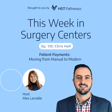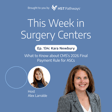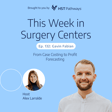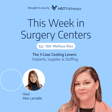Introduction to ASC Industry and Podcast Overview
00:00:00
Speaker
Welcome to This Week in Surgery Centers. If you're in the ASC industry, then you're in the right place. Every week, we'll start the episode off by sharing an interesting conversation we had with our featured guest, and then we'll close the episode by recapping the latest news impacting surgery centers.
00:00:16
Speaker
We're excited to share with you what we have, so let's get started and see what the industry's been up to.
00:00:24
Speaker
Hi everyone, here's what you can expect on today's episode.
Patient Pre-Assessments: Importance and Streamlining
00:00:27
Speaker
For our final episode in our Improving Patient Experience series, I am joined by my co-host here on the podcast, Grant Duncan, and our colleague, Marta Schultz, who in addition to being a clinical sales engineer at HST Pathways, talking to hundreds of ASC clients every year, also has a background working in risk and quality within health systems.
00:00:46
Speaker
Together, we unpack the topic of patient pre-assessments, why they're so important, not only for patient experience, but also for patient safety, when you should do them, how many forms you should have, the merits of two-way texting.
00:00:59
Speaker
But most importantly, we talk about what ASC leaders can do to get nurses off the phone and immediately begin streamlining this very critical step in their patient journey.
Operational Challenges in Gynecology ASCs
00:01:08
Speaker
Then in our data segment, we focus on benchmarks and gynecology.
00:01:12
Speaker
Looking at data from over 33,000 cases across 99 centers, the big headline, OR block utilization fell 10% year over year to just 41%. So we'll talk about that as well as some of the other trends to watch in the specialty.
00:01:26
Speaker
And we'll discuss recommendations for leaders looking to tackle some of these operational challenges at their own centers. I hope everyone enjoys the episode and here's what's going on this week in Surgery Centers.
00:01:45
Speaker
All right, welcome back to This Week in Surgery Centers. Today, we are continuing our conversation on the patient experience and digging into a topic that directly affects both patient outcomes and operational efficiency, and that is pre-assessment workflows.
00:02:00
Speaker
Pre-assessments are one of the very first touch points that a patient has with your ASC, and when they're done well, they ensure that the patient arrives prepared, the care team has all of the information that they need, and your schedule runs smoothly.
00:02:12
Speaker
But when they're done poorly, that leads to confusion, cancellations, and a whole lot of stress on both sides. So to help us unpack what good looks like and how centers can optimize this part of the surgical journey, I'm joined by two of my fantastic colleagues from HST Pathways.
00:02:27
Speaker
Grant's a familiar face, and he'll introduce himself as well.
Insights on Patient Pre-Assessments with Marta Schultz
00:02:30
Speaker
But Marta, you're new here. Tell us a little bit about what you do at HST. Hi, well, thanks for having me. My name is Marta and I've been at HST three years.
00:02:39
Speaker
I worked in implementation and training, but now I help out our sales team as a clinical sales engineer. Yeah, thanks for joining us. And Grant, if you could remind everybody what your role is, that'd be awesome.
00:02:51
Speaker
Yeah. Hey there. I co-host this podcast and lead marketing and sales development at HST. i enjoy working at the intersection of healthcare and technology and ultimately for us, helping ESCs become more proactive in their operations.
00:03:08
Speaker
We have a fun vantage point of being able to advise and learn from our 1700 plus customers. And so we can cross pollinate those learnings across centers. Well, I'm so grateful to you both for being here and joining me in this discussion. Making sure that the patient experience is dialed in is super important, especially as the industry is poising for so much growth, hopefully, over the next few years with these big CMS changes coming out. So let's jump in. And I would love to know from both of you, why do you believe that pre-assessments play such an important role in shaping that patient experience? And maybe, Grant, we can start with you.
00:03:45
Speaker
Yeah, the first experience a patient has with your ASC is probably text, an email, or a phone call from the ASC. And that text or call is probably for a pre-assessment or asking them to pay their estimate upfront for their surgical procedure.
00:04:04
Speaker
And we all knew first and impressions matter. So having an easy to use process for the pre-assessment is important. On the flip side, you know, if it's hard to fill out the pre-assessment, the patient's probably going to get annoyed at the ASC.
00:04:20
Speaker
And you might even see that reflected later in your OAS CAPS results. Last thing I'll mention is the pre-assessment is also going to ensure that the patient arrives fully prepared for surgery.
00:04:34
Speaker
And if they do that, it's going to reduce case cancellations as well. I always like to look at things from that patient experience and nobody likes to answer those same questions over and over again.
00:04:46
Speaker
It makes patients especially question your competency if you ask them those same questions again and again.
Improving Patient Experience through Personalized Care
00:04:52
Speaker
In many ASCs, we see repeat patients. If you do a cataract in one eye, you're most likely doing a cataract in the other eye.
00:04:58
Speaker
Pain patients can come back every couple of weeks. GI patients can be frequent visitors as well. And especially if their experience is positive, if it's not positive, they may not be repeat and that's even worse. So we want the patients who complete a pre-assessment to see that that information was incorporated into their visit when they arrive. And it can be as simple as asking what they prefer to be called.
00:05:20
Speaker
It's so that they know when they walk in, if they prefer to be called Keith instead of Martin, they get called Keith from the time that they hit your door. We're not having to review a long surgical history or list all their medications again and again, which can kind of make them feel not only a little intimidated, maybe even a little sad, and definitely not heard.
00:05:38
Speaker
So that makes sense. And so sticking with you, Marta, you have a lot of experience working directly with centers and seeing firsthand what their existing processes look like when we come in to improve things. So what happens when this process isn't smooth or are asking repeat information?
00:05:58
Speaker
I think we have to remember, especially from a healthcare perspective, we work there every day. It's not nerve-wracking for us to walk in. But if you're a patient, it is. They're stressed, they may be confused.
00:06:09
Speaker
But if there's missing documentation, if there's unslagged comorbidities, it can cause a delay in the procedure.
Preventing Cancellations with Effective Pre-Assessments
00:06:15
Speaker
It stresses the patient more. It causes staff burnout because they're playing catch up with the phone calls or incomplete forms instead of paying attention to the patient, which is what everybody went to school for, not to worry about their documentation. I mean, I've seen cases where every nurse has to stay late to get the pre-op calls in for the next couple days.
00:06:34
Speaker
And I can't even imagine what that costs in overtime. Most of that could have been handled by a patient with a text message and link to a survey to complete at their convenience. I've seen patients where I'm asking them what their meds are and they forget important meds.
00:06:48
Speaker
And with the rising use of these GLP medications for weight loss, if a patient forgets to disclose that and they show up day of, most often that case is canceled. And so that leads to frustration on the patient's part, loss of revenue, et cetera, because there are other patient comorbidities that can influence or deny that scheduled procedure.
00:07:10
Speaker
And then there's just comfort measures there as well. Making can a diabetic patient remain MPO all day isn't practical, but knowing a week or more in advance that they're diabetic may actually have you change that schedule.
00:07:23
Speaker
And so having that information can make everything run smoother and definitely decrease delays. That's such a great point, especially yeah the block is within the same surgeon.
00:07:35
Speaker
That's way easier to just move the case if you if you're able to see that in the pre-assessment early enough. I haven't seen anybody put hangry on there, but I wish they would. ah no that's fine Alex, what's your take on how strong pre-assessment workflows support the broader operational success at an ASC?
00:07:56
Speaker
Yeah, that's a great question. but I think there are a lot of implications for all metrics within an ASC. If you're not nailing this process, one of the biggest ones is probably case cancellations. Like Marta mentioned, when people are showing up and you don't have complete information, that puts your schedule in jeopardy. We found in our last State of the Industry report, actually, that The ASC industry case cancellation is about 21%.
00:08:20
Speaker
And so a good analogy here would be, you know, not getting your every fifth paycheck and that would not be great. So i think when you have cancellations that are related to patient info, that's really easy to rectify. Implement a really strong process here to make sure that you're at least not losing out on revenue because you didn't clarify medications or get this information in advance.
00:08:42
Speaker
I like that analogy of missing every fifth paycheck. But what probably makes the analogy even worse is it's unexpected. It's not like you can plan, okay, there's 21% that it's going to no show it's this paycheck and it's this paycheck instead.
00:08:57
Speaker
um You have no idea that it's just going to be a random one. Absolutely. I just think about all of the staff, the nurses, all of your people, they're ready to perform a surgery.
00:09:07
Speaker
And we didn't know they were on GLP-1s, right? And so now all of that money wasted if they can't work. So Grant, back to you, actually, when we're thinking about digital tools and how we... reduce the phone calls because nurses did not usually go into healthcare make phone calls. At least I haven't talked to any that have. What does a really strong pre-assessment workflow look like? What are some of the best practices that we've seen work well?
00:09:32
Speaker
Yeah, so I'll share what we've seen in talking with hundreds of ASCs about this. The first step in the workflow that we see is to first choose a secure platform for pre-assessment surveys that can send texts and emails and integrates with your EHR.
00:09:52
Speaker
Then once you've got that tool, then design ah comprehensive pre-assessment form. They've got form builders usually and make it so that it can capture all the necessary patient details and ideally use an elegant user interface so that it doesn't look like it's too old.
00:10:11
Speaker
Once you have that pre-assessment survey built, test it internally, grab a couple of colleagues, ask to send it to their phone number and see how it shows up. And then when it's good to go, maybe you've made some changes after that, then you can start sending the electronic reassessment form link to the patient, either via email or text.
00:10:32
Speaker
We've seen that it works better for surgery centers to send this in text format because people respond more quickly and more often through texts, but either can be options.
Designing Effective Pre-Assessment Workflows
00:10:44
Speaker
Now in your backend setup on your side of the tool, we also suggest sending up reminder messages to go out to encourage the form submissions. So if no response, then follow up with another text.
00:10:59
Speaker
If still no survey completion, then follow up again. And as the forms are submitted by the patients, have your clinical staff review them for completeness and accuracy.
00:11:11
Speaker
Just like you would have the nurse review them. If this was over a call, you want to still have them review it from the submission. But of course it's going to be a lot less time for them to scan through the digital submission rather than have to go back and forth live on a call.
00:11:28
Speaker
And if they do find discrepancies or maybe there's additional clarifications needed their review, then we suggest reaching out to the patient directly. You could do that through two-way texting, which is built into most pre-assessment survey tools, or you could just call them directly. and What we see a lot of centers doing is calling to get that clarification so that they can get the nuance if there is any. Another workflow setup item that we'd suggest is configuring automatic flagging so that certain form submissions or text responses flag the appropriate clinical or business office.
00:12:09
Speaker
That way, those really important allergies or other things that you want to make sure people see, it'll automatically pop up into a queue and get a flag. So, you know, these are high priority ones to to look further into.
00:12:24
Speaker
So these would be what I'd say be the most essential items to include in your pre-assessment workflow. That makes sense. That's great. Thank you. Marta, is there anything you would add here?
00:12:37
Speaker
any Any other things you would throw on that list? And then my second question would be, as you're talking to ASCs, what are you looking for to help them configure the setup and strategize what their approach is going to be? Yeah, that's such a good question because I often start with two things. I'll i ask, especially when I was in the implementations, I'll ask, what are you asking patients now?
00:13:00
Speaker
So I'll start with their form. What do you have on that form? Let's take a look at what you're asking. I'll also ask about if they know reasons for cancellation currently, because, you know, GOP medications two years ago was not really a bunch of a factor, but they certainly are now.
00:13:16
Speaker
So we start with the form and we ask it, were we asking those right questions? But I like to make sure that we don't overwhelm the patient. Nobody wants to fill out a 50 question survey. So what's more important? And then i move to the automation. Are the reminders spaced out? Are keywords being flagged for risks so that you know that you're catching those when you're reviewing them and getting that information?
00:13:37
Speaker
And then even though we're talking about automation, it's very important to ensure that those follow-up tasks are assigned to specific staff. So nothing falls through the crack. It doesn't help if every patient fills it out, but nobody looks at the information.
00:13:50
Speaker
Those are some areas I like to start with.
Removing Barriers to Pre-Assessment Completion
00:13:53
Speaker
That makes sense. Alex, question for you. do you think it matters if patients have to log in to access the pre-assessment form or do you have different takes?
00:14:05
Speaker
I actually have a pretty strong opinion here as a user of technology and a patient who has had surgery. i do think that like many centers and customers that we've spoken to, it is a barrier to have to log in It's a barrier to have to log in to just about anything, but especially something that you only use once or twice in your lifetime. It's a challenge for people to remember passwords, to go back and complete information. They get discouraged by the reset workflow.
00:14:32
Speaker
So truly the best approach here to try to get people to actually fill it out and complete the form would be to send some sort of secure link or have them provide simple verification information like a date of birth. We're meeting HIPAA standards, but it's not burdensome for the patient and you're increasing the likelihood that they do what you you want them to do and they're not dropping out of that process.
00:14:56
Speaker
But I'm curious from Marta's point of view, what kind of questions should we put on this forum? We don't want to make it too long, right? We don't want to make it so oppressive that people just opt out. But what's that balance? And what do you think we should prioritize?
00:15:08
Speaker
mean, there's certain things that definitely impact your visit. And so there's critical medical information that you want to have. Allergies, you want to make sure that you know that patient's allergies, the last thing you want to do is give them something they're allergic to. And, you know, they're medications because the GLP, but there's other medications, anticoagulants, et cetera, that could impact whether you have a procedure or when you should stop taking them, which might prompt an anesthesiologist or a nurse to call and let you know when to stop taking that. There's a ah very delicate balance with blood thinners, et cetera.
00:15:39
Speaker
So those are some areas that I definitely want to see. Significant surgical history could be helpful. Do I need to know you had your tonsils out at five? Maybe not, the but I may need to know that if you had a very bad reaction to the anesthesia. Those are the type of things that I want to ask. And I think it's important to be able to mark some questions required.
00:15:58
Speaker
so that you know you're getting that pertinent information. And then I also love the idea when you answer a question a certain way, if it triggers you for a question, because that trigger can make you not feel like, oh, there's this huge list because if you never drink alcohol, I don't need to know how often, how many and what kind, right? Or if you don't smoke, I don't need to know what it is.
00:16:21
Speaker
But if you do smoke and then you tell me you have COPD, somebody needs to talk to you before you come in for a general anesthetic. that's ah Those are the kind of things that I like to look for and how I like to use technology to trim that list.
00:16:34
Speaker
Marta, I'm curious, you've worked in multiple healthcare settings in the past.
Leveraging Experience in Quality and Risk Management
00:16:39
Speaker
I believe one of them was in quality and risk for a hospital. What were some elements you saw there that are pertinent?
00:16:48
Speaker
I love that question. And Grant, I'm going to use myself on the patient side and the quality risk side for that one, because allergies, when I keep mentioning that, people can have a very long list of allergies.
00:17:00
Speaker
They may not think to mention all of them when you're asking them on the spot. But if you give me time to fill out a form, I'm going to make sure that I have them all listed. And sometimes people don't think if it's not a medication, it's not pertinent.
00:17:13
Speaker
Or if it's this type of medication, maybe it's not pertinent. But they're all important. And from a risk management standpoint, you never want an adverse outcome for a patient. Obviously, you know, from litigious purposes, but mostly because everybody comes to work wanting patients to go home safe from an ASA. But if somebody has an allergy and they forgot to mention it and you end up giving a medication that you might have picked up with, had you known that.
00:17:42
Speaker
I just don't understand why somebody wouldn't be asking that and giving the patient time and comfort to answer that versus on the spot when they're already nervous in your facility. I've been that patient.
00:17:53
Speaker
I've received a drug I was allergic to. I'm happy to say that I'm still here to talk about it, but it just seems like a no brainer. And yet it's still a problem in healthcare care across the world. Yeah.
Reducing Patient Anxiety through Pre-Assessments
00:18:05
Speaker
I have to say, when I had surgery, Marta, I was so much more nervous than I thought I would be. I couldn't think straight. I was so glad I had somebody there to help me organize things. That's a great point. People are not thinking about those things. They're thinking, I going to wake up from anesthesia? What's going to happen? Where am I going You know? joke that it smells different when you walk in as a patient versus when you walk in as an employee.
00:18:28
Speaker
It does. it And I think it's the smell of fear. Yeah. No, we want people to be comfortable. And part of that comfort is having that assessment already woven in. So you feel seen and heard when you walk in that door.
00:18:42
Speaker
Yeah. Okay. True. Alex, what's your
Enhancing Patient Engagement with Two-Way Communication
00:18:46
Speaker
view? should texting be one way or two way texting? I really think that it needs to be two-way. I think that if you're opening up a channel to somebody and saying, I'm going to communicate with you in this channel, then the expectation is that they can communicate to you. So I think nothing's more frustrating than getting like an email from a no reply email address, but you really need to reply and you don't now know how to do that.
00:19:11
Speaker
I think texting is the same way. It's important to have that option, but additionally, you need to really think about who's going to be reviewing those communications and responding to them if you open up that capability. So think it's all part of the consideration of your strategy. What channels are we going to facilitate? Can we commit to have that be a two-way communication channel? Can we provide the resources needed to actually respond to those patients in a meaningful way?
00:19:36
Speaker
But i think you can take a cue out of any consumer marketing playbook, right? Like we really want to make it easy, remove barriers, and ensure that people are calling, texting, whatever, so that we don't have to cancel cases at the end of the day. Marta, back to you as we're talking about patient responses.
00:19:51
Speaker
So people are filling out the pre-assessment form. They're getting this data back to the ASC. What should the staff be flagging and looking for in those patient responses? That's great because there's definitely some things that everybody's going to flag.
00:20:06
Speaker
Shortness of breath. hey If somebody reports that they're short of breath, I don't care what type of anesthesia you're going to have or if you're not having anesthesia, you want to do that. And I was thinking about this as we're talking about it. It's not just about cancellation of cases. It's patient safety. We cancel cases to keep them safe.
00:20:21
Speaker
And so shortness of breath, chest pain, some should be specific depending on the ASC specialty for they have latex allergy be another one. Uncontrolled diabetes, risk of infection goes way up with that if it's not controlled.
00:20:35
Speaker
Those are some things that I would flag. And again, having that ability to create custom flags depending on your specialty, what procedures, what type of anesthesia is really important.
00:20:48
Speaker
So when those do come in there's some follow-up that needs to happen. like How do you notify the right staff that something was flagged? What does that look like? Ideally, ah right? The system needs to route those alerts into clinical cues or dashboards. And this is where we go back to technology does not replace clinical assessment.
00:21:06
Speaker
And so it's very important to assign that ownership. If we have a flagged bleeding risk that somebody's on an anticoagulant, that needs to notify a pre-op nurse and a clinical lead and potentially anesthesia so that that's there, so that that can be assessed.
00:21:20
Speaker
We can communicate with the patient about when to stop taking those anticoagulants or even if they can. So those daily checks to make sure follow-up is happening in real time, it's critical. That has to happen.
00:21:32
Speaker
But it also needs to make sure that clinicians following up with the complex patients and not burn out taking shortcuts when talking with patients. And unfortunately, I've seen that in a few facilities where they'll have the right questions, but they'll ask something and just move on ah without taking time for each of those. That's where having those flags so that when you're calling and you're looking into patients that it's critical for their safety, that makes a better experience for both the patient and for the clinical staff.
00:22:02
Speaker
That's great. ah So Grant, what's your opinion on the best timing for this outreach to
Customizing Pre-Assessments for Better Outcomes
00:22:08
Speaker
take place? When should ASCs start talking to their patients? What we see as best practice across centers is to start outreach ideally four to six weeks before surgery.
00:22:23
Speaker
If it's scheduled sooner than that, then of course, just send it right away. This gives time to find issues if there are. And then if it's incomplete, then send follow-up reminders.
00:22:34
Speaker
I'd suggest at least two, one about two weeks out, and another about 10 days prior. If it's still incomplete, then escalate to a phone call. That way you can try to really get them on the line before they have to come in.
00:22:51
Speaker
And I'd also suggest sending texts about how to prepare for the surgery eight days before and one day before so that they prepare properly.
00:23:02
Speaker
For some indications now, you have to stop taking them a week prior. So that's why the eight days is one the reminders and beneficial more than just doing the one day before.
00:23:14
Speaker
Most pre-assessment survey tools allow you to send texts, not just with a survey link, but also reminders like that. So those would be the general guidelines for what we see as best practice for timing.
00:23:29
Speaker
And I guess these questions are really for both of you to jump in, but I'm curious, should, in your opinion, a center stick to one form, a universal form? Should they create multiple? What should that look like?
00:23:41
Speaker
I think, you know, a lot of facilities can benefit from just using a universal pre-assessment form, especially if you have a lot of smart branching logic, meaning depending on the response, it triggers a second question.
00:23:54
Speaker
But there are unique cases where you are going to need an additional form. Pediatric patients, as the age is less than 12, very different considerations sometimes for those patients than for adults. High-risk specialties. We're seeing a lot of cardiovascular studies.
00:24:07
Speaker
where you're going to see a lot more patients on anticoagulants than you might in some other areas. That would be helpful to break those out. But again, you want to keep it streamlined. So I'd much rather have a second form that I could trigger based on the patient population or the procedure than to just have a very lengthy form that's not relevant to everybody. That makes sense.
00:24:28
Speaker
Yeah, because you have one form and your multi-specialty is just but potentially lots of questions patients are trying to skip or not sure if they should answer. Another piece that I've added to that is that you should also think about how to handle language because you're not always going to have patients that only speak English.
00:24:49
Speaker
So I'd suggest choosing a tool that auto translates the pre-assessment form into multiple languages. Many of them can do dozens and dozens of languages just automatically.
00:25:01
Speaker
so that way the patient can read it in whatever language is relevant to them. That's so important. From a regulatory perspective, having somebody on your staff that speaks the language but not listed as a valid translator isn't always acceptable because translating medical terminology is very different from talking to your nana in Spanish. And so that's why it's often required by regulatory bodies that you have a translation service. So having those pre-assessments, having them answered, then converting them back to English for those poor souls like myself who only speak one language is really helpful.
00:25:38
Speaker
Yeah, absolutely.
Evaluating and Improving Pre-Assessment Workflows
00:25:40
Speaker
This has been awesome, but I want to talk about where the rubber meets the road. The next steps for somebody who recognizes this is a gap. I really need to streamline what I'm doing here.
00:25:49
Speaker
Grant, if a center wants to improve their workflow, what do you recommend is the first thing they do? The first suggestion I would have is take a current state assessment, just evaluate, Hey, where are we today?
00:26:03
Speaker
If you don't have a tool to do these pre-assessments via text or email, and you're doing all calling, then i would suggest your first step be evaluating a few pre-assessment tools.
00:26:15
Speaker
The main ones you want to look at that are ASC focused are us at one at NetHealth, and Sys. If you do already have a tool, then I'd suggest appointing someone to evaluate your workflow against some of the items we talked about today.
00:26:32
Speaker
such as the automatic flagging, the sending schedule, if you're doing one way versus two way, the follow up, et cetera. Just think back to what we talked about and say, okay, let's evaluate some of those and identify where is the friction, where could we improve? And then you have a roadmap to make changes.
00:26:52
Speaker
Marta, would you add anything to that? I love that. And I think one of the things when you said evaluate your current state, I think so often people start with the form and years later, nobody's looked at it to see if it's still relevant and everybody's just skipping a certain question. A good example lately has been it's not that COVID's gone away.
00:27:10
Speaker
We still ask if you've been sick in the last five days, but we don't get as specific. Very few centers are asking about COVID vaccinations, et cetera, anymore with their patients. So take a look at those four and see if they're still relevant and update based on what's happening in your facility today.
00:27:27
Speaker
And what performance indicators should they be tracking as they're thinking about measuring improvement for implementing this process? What would you recommend, Marta? Because I come from a quality risk-managed background, all of them.
00:27:38
Speaker
But no, I would study not all of them, but there are some that I would love. I'd like to know the percentage of patients who complete the form before the day of and how far out they're completing that, because that may change how often I send it.
00:27:51
Speaker
The average time from when that form's sent to when we get it back. Do patients need just a day or is it taking them a couple days to get it back? The number of flagged issues, because that's going to probably assign how many people I'm looking at following up and calling.
00:28:05
Speaker
The time to follow up on those flagged responses. If somebody sends me something that flags, I need time to evaluate that and not frustrate them with the day before cancellation. And then last but never least is that cancellation rate related to missing information.
00:28:21
Speaker
Often do they fill it out, but we get there and there's something that said that maybe changes what happens for that procedure that we could have captured in that form. And that goes back to evaluating how long it been since you looked at your form.
00:28:35
Speaker
So those are just a couple, but I love data. I could add tons of more to that. That's great. Those are super helpful KPIs. And I hope everybody listening wrote them down because it's a great list to start
Shifting from Phone-Based to Digital Pre-Assessments
00:28:47
Speaker
Alex, I mentioned ah couple of suggestions and Marta did as well. What would you add? Let's say if a center is still doing their pre-assessments all via phone calls.
00:29:00
Speaker
If you want to take your efficiency from zero to 60, eliminating those phone calls is a huge step. It's so time consuming. Honestly, people don't really answer their phones. so You're going to voicemail, now you're playing phone tag.
00:29:14
Speaker
That's not what nurses want to be doing. If you're looking to free up nurse time, streamline some of your operational metrics, get better data. There's just so many upsides to switching to a digital process here. I think that's absolutely true. And one of the things that I maybe say, it if you're not doing it, ask three or four your patients when they come in would you have preferred to do this over text when you're calling them? Would you have answered this over text or email?
00:29:38
Speaker
yeah And see, because I'm willing to bet the majority of patients would have answered yes to that, that they would have said, yeah, I'd like to do that. And then go ahead and ask your staff. How many of you would prefer to only call patients problem versus every single patient?
00:29:53
Speaker
Sometimes ASCs who serve populations of patients that skew older are concerned being, well, they're not going to text, but I know a lot of elderly people who actually do communicate with their grandchildren over texts and that email.
00:30:13
Speaker
So sure, maybe the percentage is a little lower than someone in their forties, but there's still going to be a high percentage that are going to be willing to do it.
00:30:24
Speaker
Grant, I always use my cousin as an example. She would not text. She didn't want any part of it. And then she got a grandchild and she wanted those pictures over the phone. And now that woman texts me almost every day. but Absolutely. And I'm holding that population you're thinking about. And even I could text with my thumbs now. So we know adoption is here. i think we'll find that more and more that that's less of a concern for sure.
00:30:50
Speaker
Very different answer five years ago. Very different than there would be
Conclusion and Actionable Steps for Workflow Improvement
00:30:54
Speaker
today. There's one thing that we do every week on the podcast, and I'm going to ask you both and then I'll answer it myself.
00:31:01
Speaker
But what's one thing that listeners can do this week to improve their surgery centers? Marta, I'll start with you. I'm going to repeat an answer only because saint asking your staff and asking your patients.
00:31:15
Speaker
First of all, everybody feels important when you ask for their opinion. Getting their opinion about this or anything else and then using data to either find out if that's valid or not is probably the best way you can start improving your ASC.
00:31:31
Speaker
That's some data. I love that. What about you, Grant? I would say choose one of the metrics we discussed today related to pre-assessment surveys and make that metric your next QAPI study.
00:31:46
Speaker
You can work to improve it and then you get a two for one yeah when you improve the workflow and get a QAPI study out of it. cancellations would be perfect, right? I mean, everybody looks at them, but how often do you look and and categorize them versus saying other?
00:32:00
Speaker
Anytime other is more than 10% of your answers, you need to break that out, right? I'd love that for a QAPI study. Yeah. How about you, Alex? Everybody who heard this episode and thought, I need to do this, go schedule some demos for some pre-assessment tools and start seeing what's out there and seeing what these capabilities are. If you haven't explored digital solutions, go learn about them and start gathering information. Schedule some calls. so This has been awesome. Grant, Marta, really grateful you could join.
Trends and Challenges in Gynecology ASCs Data Analysis
00:32:37
Speaker
This week, let's take a closer look at gynecology ASCs. We analyzed more than 33,000 cases across 99 centers, and the story the data tells is one of progress in some areas, but pressure in others.
00:32:51
Speaker
So let's start in the OR. In 2023, gynecology centers were using 51% of their block time. Fast forward to 2024, and that number has slipped to 41%. That means that nearly six out of every 10 minutes of allocated block time is going unused.
00:33:06
Speaker
And for AOCs, this isn't just about numbers, it's really about missed opportunities. More than anything, this reflects a breakdown in coordination. Too often, scheduling is handled with phone calls and faxes, which causes delays.
00:33:19
Speaker
But the centers that are using technology to broadcast OR availability and automate scheduling are the ones getting closer to that gold standard of 70% utilization. Now, let's shift to the front end of the revenue cycle and talk about pre-authorization.
00:33:33
Speaker
Here, the rate climbed from 10% to 13%. That's more patients requiring para-approval before their surgery. On the surface, that might seem like a burden, but it can actually prevent last-minute cancellations and denials because it forces confirmation up front.
00:33:48
Speaker
the challenge for ASCs is not assuming that the physician's office has it handled. Centers that verify authorizations themselves and use integrated payer technology are the ones who avoid operational hiccups and financial surprises.
00:34:00
Speaker
But verification, that's where the story stalls. Insurance verification rates held steady at 56% year over year, and that is well below the multi-specialty average.
00:34:11
Speaker
Without strong verification, centers risk cancellations, delayed billing, and denied claims. The best approach is simple. Double-check coverage when you schedule the case, and then again on the morning of surgery.
00:34:22
Speaker
Then run monthly sweeps to catch any lapses. Automating these checks makes it painless and ensures smoother patient care. And speaking of cancellations, the rate climbed slightly from 15.2% to 15.9%. And when we look deeper, it looks like the majority are patient-driven or provider-driven.
00:34:40
Speaker
That means that many of these cancellations could have probably been avoided with better processes. A missed lab, a scheduling error, simply poor communication with patients, maybe the lack of a pre-assessment workflow, all of these add up to wasted block to time.
00:34:55
Speaker
Centers that are proactive with patient outreach and use a centralized system to keep all of their care teams aligned are the ones without these disruptions. Patient deposit collection stayed steady at 67%, which is encouraging.
00:35:07
Speaker
And billing got faster. Average days to bill dropped from 7.4 to 6.7. That means money is coming in sooner and with less administrative lag. Add to that the fact that reimbursement per case is climbing from about $2,900 to $3,447, and the revenue side is looking strong.
00:35:26
Speaker
but Those claim denials are creeping up from 6% to 7%, and that small increase can eat away at those revenue gains pretty quickly. It's a reminder that efficiency on the clinical side only pays off when it's matched by discipline on the billing side.
00:35:40
Speaker
So what's the big picture? This is really a story of two trajectories, financial performance moving up, but operational efficiency pulling down. And the centers that thrive are the ones who can bridge that gap.
00:35:52
Speaker
And that wraps up today's episode. Thanks again to Grant and Marta for joining me this week. And thank you to every single one of you for taking a few minutes of your day to spend some time with us. If you enjoy our podcast, please be sure to leave us a rating or review on your favorite platform and join us next time.
00:36:09
Speaker
We'll see you again soon.




















